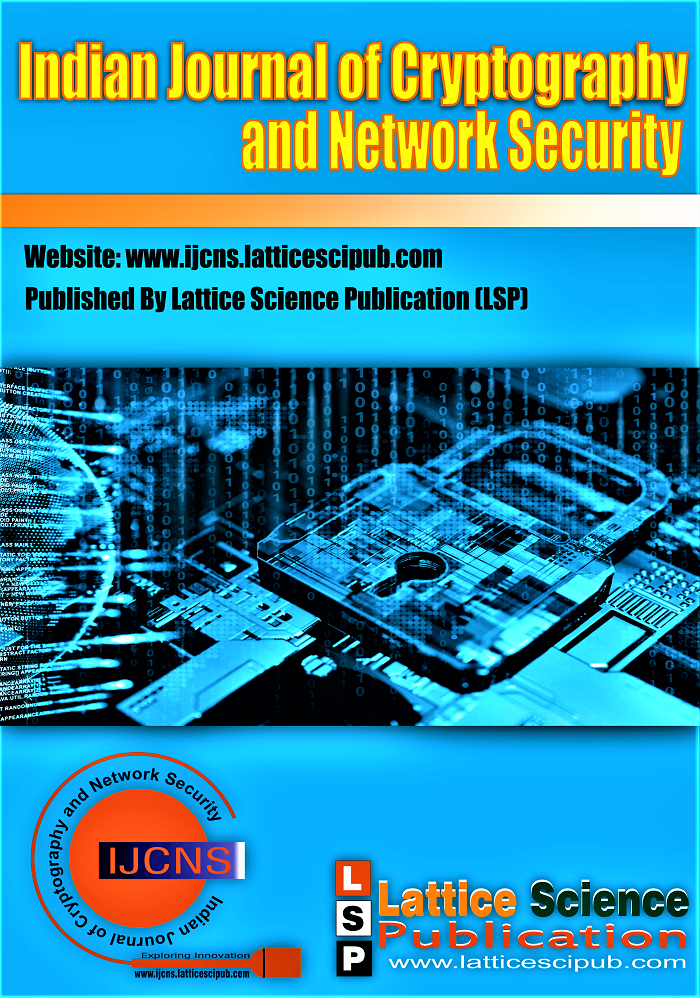From Inception to Realization: NIST's Post-Quantum Cryptography Standardization
Main Article Content
Abstract
Cryptography is a term that safeguards the security of electronic banking transactions, and emails, and most importantly our country relies on cryptography for national security purposes. Post Quantum Cryptography (PQC) has a major aim of developing newer cryptographic schemes that make the cryptosystem secure against quantum computers. This is a state-of-the-art research topic, and it is encouraged by some security agencies like the National Security Agency (NSA). This paper presents a concise and up-to-date review of post-quantum cryptographic (PQC) algorithms submitted to the National Institute of Standards and Technology (NIST) for standardization. Highlighting the need for cryptographic resilience in the era of quantum computing, the study focuses on the technical evaluation of candidate algorithms, including their performance in terms of time and space efficiency. It also examines the progression of these algorithms through NIST’s multi-round selection process, highlighting key developments and implementation challenges. The paper aims to provide researchers with a clear overview of the current state of PQC standardization and the practical considerations involved in deploying secure, quantum-resistant cryptographic solutions.
Downloads
Article Details

This work is licensed under a Creative Commons Attribution-NonCommercial-NoDerivatives 4.0 International License.
How to Cite
References
Chen, L., Chen, L., Jordan, S., Liu, Y. K., Moody, D., Peralta, R., ... & Smith-Tone, D.: Report on post-quantum cryptography (Vol. 12). US Department of Commerce, National Institute of Standards and Technology. (2016) https://www.nist.gov/publications/report-post-quantum-cryptography
Roy, K. S., & Kalita, H. K.: A Survey on Post-Quantum Cryptography for Constrained Devices. International Journal of Applied Engineering Research, 14(11), 2608-2615. (2019) https://www.researchgate.net/publication/334603386_A_Survey_on_Post-Quantum_Cryptography_for_Constrained_Devices
Grote, O., Ahrens, A., & Benavente-Peces, C.: A Review of Post-quantum Cryptography and Crypto-agility Strategies. In 2019 International Interdisciplinary PhD Workshop (IIPhDW) (pp. 115-120). IEEE. (2019) https://ieeexplore.ieee.org/document/8755433
Fernández-Caramés, T. M.: From pre-quantum to post-quantum IoT security: A survey on quantum-resistant cryptosystems for the Internet of Things. IEEE Internet of Things
Journal, 7(7), 6457-6480. (2019) https://doi.org/10.48550/arXiv.2402.00790
LI Jian, LI Na, ZHANG Yu, WEN Shuang, DU Wei, CHEN Wei, MA Wenping. A Survey on Quantum Cryptography[J]. Chinese Journal of Electronics, 2018, 27(2): 223-228. DOI: http://doi.org/10.1049/cje.2018.01.017
Koziel, B., Azarderakhsh, R., Kermani, M. M., & Jao, D.: Post-quantum cryptography on FPGA based on isogenies on elliptic curves. IEEE Transactions on Circuits and
Systems I: Regular Papers,
(1), 86-99. (2016) DOI: http://doi.org/10.1109/TCSI.2016.2611561
Lily Chen,StephenJordan,Yi-Kai Liu, Dustin Moody, Rene Peralta, Ray Perlner, Daniel Smith-Tone, “Report on Post-Quantum Cryptography”,NISTIR 8105, April 2016 http://dx.doi.org/10.6028/NIST.IR.8105
https://csrc.nist.gov/csrc/media/projects/key management/documents/transitions/transitioning_cryptoalgos_070209.pdf
Ferozpuri, A., Farahmand, F., Dang, V., Sharif, M.U., Kaps, J.P. and Gaj, K., 2018. Hardware api for post-quantum public key cryptosystems. Technical Report. https://api.semanticscholar.org/CorpusID:156047785
Phoon, J.H., Lee, W.K., Wong, D.C.K., Yap, W.S. and Goi, B.M., 2020. Area–Time-Efficient Code-Based Postquantum Key Encapsulation Mechanism on FPGA. IEEE Transactions on Very Large Scale Integration (VLSI) Systems, 28(12), pp.2672-2684. DOI: http://doi.org/10.1109/tvlsi.2020.3025046
Phoon, J.H., Lee, W.K., Wong, D.C.K., Yap, W.S., Goi, B.M. and Phan, R.C.W., 2020. Optimized IoT Cryptoprocessor Based on QC-MPDC Key Encapsulation Mechanism. IEEE Internet of Things Journal, 7(9), pp.8513-8524. DOI: http://doi.org/10.1109/JIOT.2020.2991334
Rodas, R.N.P., Lin, Y.D., Lu, S.L. and Chang, K.J., 2021. O2MD²: A New Post-Quantum Cryptosystem With One-to-Many Distributed Key Management Based on Prime Modulo Double Encapsulation. IEEE Access, 9, pp.109260-109288. DOI: http://doi.org/10.1109/ACCESS.2021.3100551
Announcing Request for Nominations for Public-Key Post-Quantum Cryptographic Algorithms. 2016. https://www.federalregister.gov/documents/2016/12/20/2016-30615/announcing-request-for-nominations-for-public-key-post-quantum-cryptographic-algorithms
PQC Standardization Process: Announcing Four Candidates to be Standardized, Plus Fourth Round Candidates. 2022. https://csrc.nist.gov/News/2022/pqc-candidates-to-be-standardized-and-round-4
Comments Requested on Three Draft FIPS for Post-Quantum Cryptography. 2023. https://csrc.nist.gov/news/2023/three-draft-fips-for-post-quantum-cryptography
Chad Boutin, (2024). NIST Releases First 3 Finalized Post-Quantum Encryption Standards. https://www.nist.gov/news-events/news/2024/08/nist-releases-first-3-finalized-post-quantum-encryption-standards#:~:text=NIST%20announced%20its%20selection%20of,is%20planned%20for%20late%202024. (2024)
Tom, Dr. J. J., P. Anebo, Dr. N., Onyekwelu, Dr. B. A., Wilfred, A., & E. Eyo, R. (2023). Quantum Computers and Algorithms: A Threat to Classical Cryptographic Systems. In International Journal of Engineering and Advanced Technology (Vol. 12, Issue 5, pp. 25–38). DOI: https://doi.org/10.35940/ijeat.e4153.0612523
Abdullah, Dr. A. A., & Mahdi, Dr. S. S. (2019). Hybrid Quantum-Classical Key Distribution. In International Journal of Innovative Technology and Exploring Engineering (Vol. 8, Issue 12, pp. 4786–4791). DOI: https://doi.org/10.35940/ijitee.l3682.1081219
Shiny Irene D, G. Vamsi Krishna, Nalini M, Era of Quantum Computing- An Intelligent and Evaluation based on Quantum Computers. (2019). In International Journal of Recent Technology and Engineering (Vol. 8, Issue 3S, pp. 615–619). DOI: https://doi.org/10.35940/ijrte.c1123.1083s19





